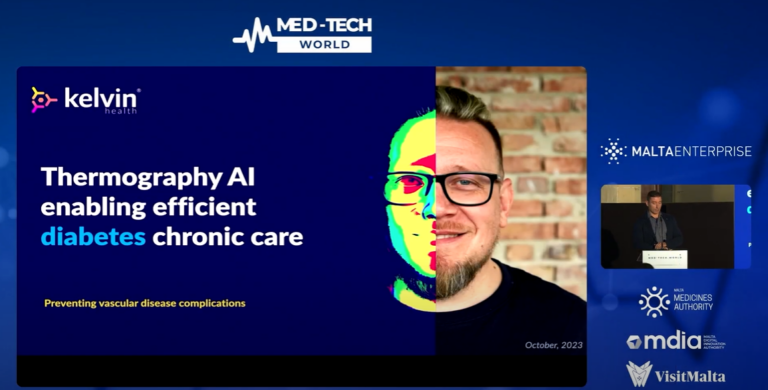
Michael Joe Cini
7th December 2023
Reading the Heat: Digital thermal imaging and other hot AI trends in patient care
In 2023, AI seized attention, notably in healthcare with substantial growth. Shifting to patient care, a crucial question arises: “Is there equitable reimbursement for patients?” This emphasises the imperative of equitably distributing AI benefits, especially for enhancing patient care.
At the Med-Tech World Summit in Malta last October, Kelvin Health’s CEO, Georgi Kadrev, presented a compelling case. The company is dedicated to democratising an enhanced and streamlined patient experience through AI analysis in mobile-based digital thermal imaging.
(Watch the keynote here)
 Charting the course for patient-centric AI innovations
Charting the course for patient-centric AI innovations
According to Grand View Research (GVR), the global AI in healthcare market was valued at USD 22.45 billion in 2023. Simultaneously, AI chatbots, a significant contributor to this expansion, were reported to generate around USD 5.64 billion in revenue during the same year, as per estimates by Mordor Intelligence.
Cruising the wave of investment-driven innovation, Kelvin Health sees thermography AI as the potential cornerstone for vascular diagnostics. Speaker Georgi Kadrev described how accessible and affordable thermal hardware, coupled with advanced machine learning algorithms, perfectly align with the patient-centric trend in healthcare.
“Our core value is our greatest strength; healthcare should impact lives at scale—making us your perfect candidates for a future-focused healthcare journey.”
From pain to precision
The story of Kelvin Health unfolded through a coming-together of several personal experiences, a moment of severe pain, and a subsequent search for a diagnosis. What began as a set of serendipities within the founding team and their loved ones transformed into a mission-driven venture.
“Clear from the onset, our mission is to make preventable deaths and suffering from conditions like lymph ischemia, especially for patients with diabetes, a thing of the past.”
In the midst of enduring a three-week marathon of invasive medical tests and specialist handoffs, Kadrev found himself in a moment of personal agony. It was during this challenging time that he had a simple yet profound idea: take a thermal image. Little did he know that this spontaneous decision would uncover the source of his suffering—an unsuspecting small kidney stone.
This breakthrough experience illuminated the capacity of thermography AI to unveil complexities often missed by traditional invasive examinations. Even in its early stages, Kelvin Health demonstrated the capability to detect anomalies such as inflammation and vascular blockages.
This ultimately sparked a commitment to leverage the potential of thermography combined with AI, aiming for streamlined, non-invasive diagnostics, screening, and monitoring of vascular conditions.
Revolutionising vascular healthcare
Specialists addressing vascular patients grapple with the limitations of slow and invasive examinations. Traditional methods such as ankle-brachial index and Doppler ultrasound often fall short in precision, urging the need for more effective diagnostic approaches.
The synergy of thermography and AI emerged as a promising solution, introducing a patient-friendly approach with the convenience of a mobile camera. This transformative development goes beyond diagnostics; it’s about reshaping the entire patient experience, simplifying it to the ease of taking a thermal image.
“It was clear to us that Kelvin Health has the potential to transform the standard of care for vascular screening, monitoring, and diagnostics”
In comparative analyses against X-ray angiography, Kelvin Health showcased the effectiveness of thermography in identifying vascular issues. Its non-invasive capabilities were apparent as it uncovered conditions potentially overlooked by Doppler ultrasound specialists.
This success translated into real-world applications, with Kelvin Health forming partnerships that involved over 910 patients worldwide. Vascular specialists acknowledged the immediate impact of Kelvin Health, representing a pivotal stride in reshaping the standard of care for vascular screening and diagnostics.
“Our vision extends far beyond the confines of secondary care; it aspires to initiate a paradigm shift towards widespread population screening in primary care settings and pharmacies.”
 Hottest healthcare-optimising trends in 2024
Hottest healthcare-optimising trends in 2024
As startups like Kelvin Health explore the expansive possibilities of AI, it’s crucial to remember that AI is not a newcomer to the healthcare and clinical diagnostics landscape.
From digital pathology to AI applications in NextGen Sequencing (NGS) analytics, and even speech recognition for clinical notes conversion, AI has already made significant strides. However, the potential for AI in these domains is far from exhausted, leaving ample room for further advancements.
Frictionless patient experience
Patient information gathering poses a significant challenge due to extensive details required for prior authorizations and eligibility checks. Robotic Process Automation (RPA) and AI emerge as solutions.
While RPA automates keystrokes, AI goes beyond, eliminating friction points in the patient-provider information exchange. AI, applied strategically, unveils critical payor details, streamlining claim processing.
Streamlined payor interactions
Manual interventions, denials, and reason codes complicate payor interactions. AI steps in, deciphering payor responses with optical character recognition (OCR) and machine learning models.
By interpreting insurance card data and automating acknowledgment responses, AI ensures efficient interactions. It simplifies the complex landscape of contracted and non-contracted plans, accelerating the resolution of claims.
Actionable insights from payor responses
AI introduces a financial game changer by predicting potential issues in claims and proactively addressing them.
By reducing noise, automating manual processes, and prioritising exceptions based on likelihood of payment collection, AI transforms the RCM process. It enhances workflow efficiency, assigns tasks intelligently, and directs human attention to claims that require manual intervention.
Cutting-edge RCM Infrastructure for efficiency
The foundation for effective AI implementation lies in structured data. Purposeful data modelling ensures reliable results. AI, by reducing manual touchpoints, correcting errors, and improving dollar recoupment, leads to substantial time and cost savings.
A future-ready RCM infrastructure, guided by AI, empowers diagnostic leaders to focus on patient care, fostering better insights and enhanced operational efficiency.
Med-Tech World is breaking new ground in 2024
In just two years, the Med-Tech World Summit has become a global force, making waves in Dubai, Toronto, Belgrade, London, and Istanbul. Excitingly, the journey continues in 2024 with new horizons in Barcelona and Berlin. Get ready for more groundbreaking insights, connections, and transformative developments in the dynamic world of medical technology!
Stay Ahead: Subscribe To Our Newsletter Today!
Be the first to receive exclusive updates on ticket prices, special discounts, and all the exciting details about Med-Tech World Malta 2024. Stay ahead of the curve by subscribing to our newsletter. Don’t miss out on the latest news and opportunities – secure your spot in the forefront of the medical technology revolution. Subscribe now and be part of the future!



 Charting the course for patient-centric AI innovations
Charting the course for patient-centric AI innovations Hottest healthcare-optimising trends in 2024
Hottest healthcare-optimising trends in 2024


